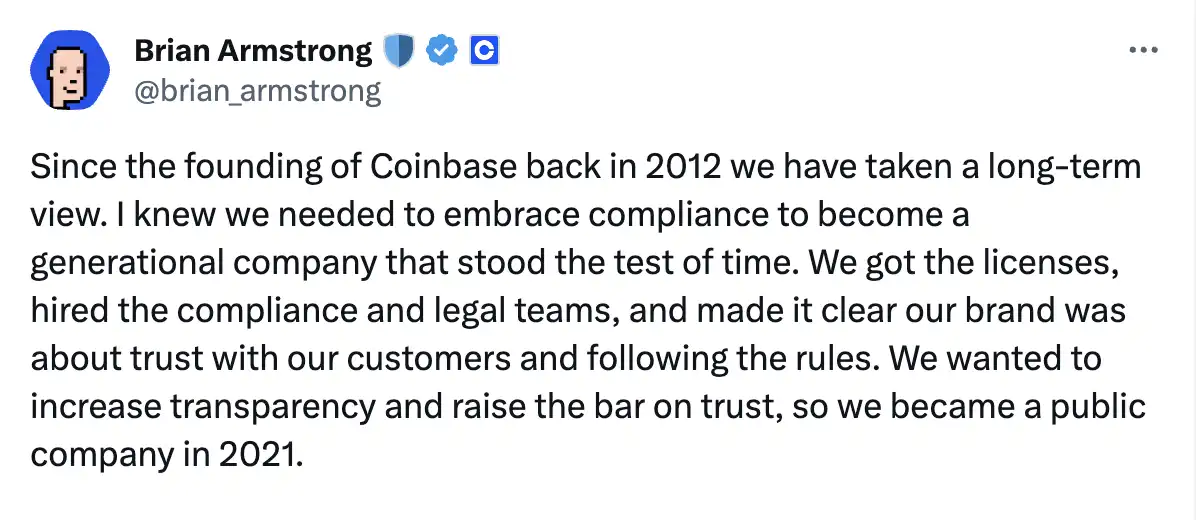Editor's note: Coinbase (COIN) stock price recently hit an 18-month high. According to TradingView data, on November 27th, Coinbase closed at $119.77, the highest level since May 5, 2022. Analysis by Bloomberg ETF analyst James Seyffart shows that Coinbase is the custodian of 13 of the 19 spot crypto ETFs currently awaiting approval by the U.S. Securities and Exchange Commission.
Many believe that Binance's settlement with U.S. regulators is a positive development, and as the leading U.S. trading platform, Coinbase also seems to be seen as benefiting from the Binance plea. However, the entry of BlackRock in the future and regulatory trends also add unpredictability to Coinbase's prospects.
Original title: Does Coinbase benefit from Binance's guilty plea?
Original author: Joanna Wright, DLNews
Original translation: Kaori, BlockBeats
As Binance's legal uncertainties are resolved, Coinbase, as the largest cryptocurrency trading platform in the United States, finds itself in a prominent position.
On one hand, it has the opportunity to capture a portion of Binance's market share in the U.S. On the other hand, legal experts point out that Binance's regulatory ripples will pose a challenge to Coinbase's business model.
Before delving deeper, let's first take a brief look back:
Binance, the world's largest cryptocurrency trading platform, pleaded guilty to U.S. criminal charges for failing to establish anti-money laundering protections. According to the settlement agreement reached with the authorities, Binance will pay a $4.3 billion fine and undergo an intensive monitoring program for three years. Its CEO and founder, CZ, has resigned from his position.
What does this have to do with Coinbase?
Silicon Valley veteran Brian Armstrong founded Coinbase in 2012, and the exchange chose a compliant path—obtaining state licenses, conducting strict reviews and restrictions on listed currencies, and even going public in 2021.
This approach caused Coinbase to pay a price when Binance emerged in July 2017.
As Armstrong recently wrote, going public meant that Coinbase "can't always move as fast as other companies."
"Doing things in a compliant way is harder and more expensive. When it comes to illegal activities, you can't roll out every product customers want," Armstrong said.

Regulators accused CZ and Binance executives of knowingly evading securities laws to gain illegal profits. Binance also operated with layers of obfuscation, making its corporate structure elusive—for example, it did not list a board of directors or headquarters in any country. At its peak, Binance accounted for 60% of global cryptocurrency trading volume and still holds about 43% of market share.
Coinbase will face a more flexible market
Last week's events proved that Armstrong's cautious approach was correct.
Binance has begun delisting trading pairs and assets, including the token TORN from the sanctioned cryptocurrency mixer Tornado Cash.
It now has to strengthen compliance, cannot act quickly and disrupt the rules. This will cost Binance. After speaking with most legal experts, I found that they generally expect Binance to completely withdraw from the U.S.
This is good news for U.S. competitors, especially for companies like Coinbase that strive to meet regulatory standards, as aron Unterman, Managing Director of XReg Consulting, told me. "For those companies, this is a good situation, although it will be a disadvantage in terms of market share for quite some time," he said.
In addition, the punishment of Binance makes Coinbase face a more flexible market.
"If this had happened a year ago, it would have had a significant ripple effect, severely damaging the cryptocurrency market," Unterman said. "But this impact did not cause panic or concerns about other failures. This was foreseeable and created opportunities for other participants in the market."
Competitors are not just Binance
However, Binance's judgment will also create a more complex situation for Coinbase.
Cryptocurrency investors are eagerly awaiting regulatory approval for spot Bitcoin trading platform exchange-traded funds (ETFs) submitted by heavyweight asset management companies like BlackRock.
According to some market observers, the fact that the world's largest trading platform is no longer a charged enterprise has legitimized the industry and increased the likelihood of ETF approval.
However, this is not purely advantageous for Coinbase. Competition from BlackRock could compress fees to almost zero, which is a blow to a trading platform that charges between 0.6% and 3%.
In addition, Coinbase's ongoing litigation with the U.S. Securities and Exchange Commission is a major issue, depending on the interpretation of technical securities laws, rather than criminal charges.
However, Unterman suggests that Binance's case may support the SEC's claim to be the primary regulator of cryptocurrencies—a claim that underpins its lawsuit against Coinbase.
免责声明:本文章仅代表作者个人观点,不代表本平台的立场和观点。本文章仅供信息分享,不构成对任何人的任何投资建议。用户与作者之间的任何争议,与本平台无关。如网页中刊载的文章或图片涉及侵权,请提供相关的权利证明和身份证明发送邮件到support@aicoin.com,本平台相关工作人员将会进行核查。




